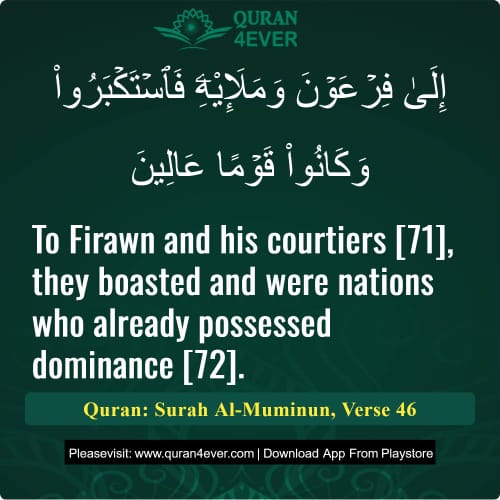
Transliteration:( Ilaa Fir'awna wa mala'ihee fastakbaroo wa kaanoo qawman 'aaleen )
"To Firawn and his courtiers [71], they boasted and were nations who already possessed dominance [72]."
This verse confirms that Hazrat Musa (عليه السلام) was sent as a Prophet to all Egyptians—whether Israelites, Coptics, or even the magicians. While he is referred to elsewhere as the Prophet of the Israelites, this broader address includes all people of Egypt, indicating the universality of his mission.
Pharaoh and his people were boastful due to their worldly power, believing themselves secure and dominant. This teaches that worldly prosperity despite sinful behavior is not a sign of divine approval—rather, it may be a form of punishment or divine deception. Similarly, trials faced by the righteous, including Prophets and saints, are often a sign of Allah’s special mercy, not His anger.
The tafsir of Surah Al-Muminun verse 46 by Ibn Kathir is unavailable here.
Please refer to Surah Muminun ayat 45 which provides the complete commentary from verse 45 through 49.
(23:46) to Pharaoh and to his chiefs, but they behaved superciliously and they were haughty.[40]
40. The words in the text may either mean: (1) They were highly arrogant and tyrannous people, or (2) They showed haughtiness and self conceit.
40a For explanation, see (Surah Al-Muminun, ayat 24) note 26.

For a faster and smoother experience,
install our mobile app now.
Related Ayat(Verses)/Topics